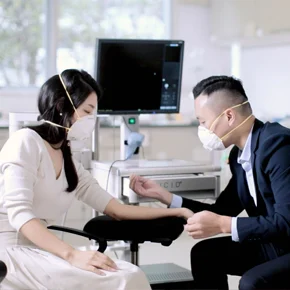Air pollution not only affects your health but can also lead to dry skin, acne and more.
Dry skin, dull skin and acne — there are many causes for these skin problems, but did you know that the very air that surrounds you could also be one of the contributing factors? More than simply being harmful to our health, micro pollutants like PM 2.5 could cause big problems for our skin too.
What is PM 2.5?
Particulate matter (PM), a key component of air pollution, refers to a mixture of solid and liquid particles in the air. Micro pollutants that have a diameter of less than 2.5 micrometers are referred to as PM 2.5. If you’re wondering how small that is, just imagine this: the diameter of a strand of your hair is about 30 times wider than that of the largest fine particle!
Where do these pesky micro pollutants come from? Common sources of air pollution include vehicles that run on either diesel or petrol, power plants and fires. Unfortunately, staying indoors does not mean that you won’t be exposed to air pollution: smoking (including second-hand smoke!), open fires, gas stoves and even paints and household cleaning products can contribute to indoor air pollution.
Air Pollution Problems
Smaller than even the pores of your skin, PM 2.5 can easily penetrate into the skin and disrupt the skin barrier, which is the layer that helps to protect and keep your skin hydrated. It doesn't help that PM 2.5 is also difficult to remove from your skin, which could bring about even more skin problems!
This can be particularly alarming for city dwellers. In fact, only 20% of the world's urban population are living in areas with an acceptable level of PM 2.5, says the World Health Organization in a survey of over 4,300 cities.
“Constant exposure to air pollution will cause a 60% moisture loss, leading to skin dryness and dullness,” shares Taiwan-based dermatologist Dr Wu Ching Ying. “In the long run, it may also lead to aging skin, acne and skin irritation.”
How to Fight Air Pollution Effects
For those of us who live in cities, it may seem impossible to avoid the effects of air pollution, especially when the air is filled with yellow dust or fine dust.
Thankfully, it’s not all doom and gloom. To minimize the impact of air pollution on your skin, Dr Wu recommends cleaning your face twice a day with a facial cleanser that not only removes dirt and other impurities, but also takes away micro dust. As micro pollutants like PM 2.5 are very small and can be difficult to remove, your safest bet is a face cleanser that has been clinically proven to effectively cleanse away micro pollutants.
The Neutrogena Deep Clean Foaming Cleanser is clinically proven to remove 99% of micro pollutants including PM 2.5 while keeping your skin moisturized and glowing, thanks to the best-in-class pure glycerin used! Find out more about glycerin here.




